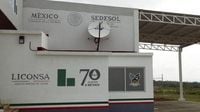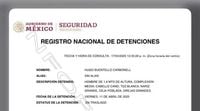In a significant development in Mexico's ongoing battle against corruption, Hugo Buentello Carbonell, the former deputy director of operations at Liconsa, was arrested on April 11, 2025, for his alleged involvement in a high-profile corruption case linked to Seguridad Alimentaria Mexicana (Segalmex). This arrest marks a notable moment in the scrutiny of public officials associated with the previous administration of President Andrés Manuel López Obrador.
The arrest was executed as Buentello was leaving the United States embassy in Mexico, according to reports from Mexicanos contra la Corrupción y la Impunidad (MCCI). He is accused of organized crime due to his role in signing contracts for thousands of liters of milk that were never delivered during his tenure at Liconsa, which is a subsidiary of Segalmex responsible for the industrialization and distribution of milk in the country.
Buentello's arrest is part of a broader investigation that has already seen the apprehension of other key figures. Notably, Edgar Alejandro Armenta Peralta, a representative of Grupo Vicente Suárez, was arrested in April 2023, followed by René Gavira Segreste, the former director of administration at Segalmex, in December 2023. These developments highlight the extensive network of corruption allegations surrounding Segalmex and its operations.
Between September 2019 and March 2021, Buentello served as deputy director of operations at Liconsa, a position from which he allegedly signed contracts that have been scrutinized for irregularities. One such contract involved a staggering 320 million pesos awarded to ILAS México, a multinational company implicated in a money laundering scheme involving food shipments to Venezuela. This contract was modified in February 2020 with Buentello's approval, raising further questions about the oversight and accountability within Liconsa.
Additionally, Buentello was involved in another controversial contract for the purchase of 50,000 bags of powdered milk for 86 million pesos with Grupo Vicente Suárez 73 SA de CV. Reports indicate that under Buentello's management, this contract was poorly executed, with Grupo Vicente Suárez subcontracting 100% of the services to another company and failing to deliver the agreed-upon products. The Auditoría Superior de la Federación (ASF) reported these findings in its audits, revealing that Liconsa did not provide the necessary documentation to prove that it had received the milk bags.
Segalmex, established by López Obrador in 2018 to ensure food security in Mexico, has been mired in controversy since its inception. The organization was formed by merging Diconsa and Liconsa, with the goal of achieving self-sufficiency in staple foods. However, in its first two years of operation, the ASF uncovered irregularities amounting to 15.3 billion pesos, raising alarms about the management of public funds.
In July 2021, MCCI revealed that Segalmex had allocated 797 million pesos to a network of shell companies and suppliers that failed to deliver essential goods, including pesticides and packaging materials. This pattern of mismanagement and illicit activity has led to heightened scrutiny from both the public and governmental bodies.
In a related incident that further tarnished Segalmex's reputation, authorities in Hong Kong seized over one ton of methamphetamine from Mexico in November 2023, concealed in sacks bearing the Segalmex logo. This seizure, valued at approximately 81.8 million U.S. dollars, prompted Segalmex to issue a statement disavowing any involvement in the drug trade, insisting that it does not export products.
The implications of these scandals extend beyond individual arrests; they reflect systemic issues within Mexico's public institutions. Critics argue that the corruption within Segalmex represents a failure of oversight and accountability in government operations, particularly in programs designed to support vulnerable populations.
As investigations continue, the focus remains on how these corruption allegations will impact public trust in governmental institutions and the effectiveness of social programs aimed at alleviating poverty and ensuring food security.
Hugo Buentello Carbonell's arrest is a pivotal moment in the ongoing efforts to combat corruption in Mexico. As the legal proceedings unfold, the case will likely reveal more about the intricate web of relationships and practices that have allowed such widespread corruption to persist in public institutions.
With the backdrop of these events, the Mexican government faces significant challenges in restoring public confidence and ensuring that resources meant for the country's most vulnerable populations are not siphoned off by corrupt practices. The unfolding story of Buentello and his associates serves as a stark reminder of the work that remains to be done in the fight against corruption in Mexico.









